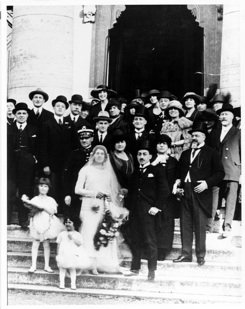31/1/2010
Memories of Roman Jews
Different venues, New York
Beyond inquisition and persecution. Through film, lectures, and discussion, this series of four programs opens a window on the rich cultural landscape of Roman Jewry while exposing tragic moments in its history: the round up of the community in 1943 and the abuses and forced baptisms of the times of the ghetto.

A journey through fragments of memory of a vital and distinctly independent Jewish community in whose traditions and history the antique and the modern coexist, as in a jewelry box handed down through generations. Through film, lectures, and discussion, this series of four programs opens a window on the rich cultural landscape of Roman Jewry while exposing tragic moments in its history: the round up of the community in 1943 and the abuses and forced baptisms of the times of the ghetto.
February 1, 6:00 pm
FORCED CONVERSIONS IN PAPAL ROME
NYU Casa Italiana Zerilli Marimò
24 West 12th Street, NYC | Preview
Film screening | Confortorio
Directed by Paolo Benvenuti
(Italy, 1992, 90 min. Italian w/English subtitles).
Based on a true story, Confortorio narrates the vicissitudes of two young Roman Jews who are imprisoned under the accusation of theft during the pontificate of Clement XII, in 1736. The night before their execution, the fathers of the Confraternita of San Giovanni Decollato try to force them to embrace Christianity.
February 2, 7:30 pm
OCTOBER 16th, 1943: THE GIRL WHO ESCPED THE ROUND UP
JCC in Manhattan
334 Amsterdam Avenue, NYC | Read more
Film Screening | Una Storia Romana
An Interview with Enrica Sermoneta
by Pupa Garribba, 2009 (Italian w/English subt)
Introduction by Nicola Zingaretti, President of the Province of Rome
This is the most recent document and probably one of the last testimonies of the round up of the Ghetto of Rome. Journalist and writer Pupa Garribba interviews Enrica Sermoneta, who, as a young girl, fortuitously escaped deportation amidst generosity and betrayal. Told in a direct and unconventional style, filtered through the lens of 67 years of debate on the “black Saturday,” the story raises old dilemmas and new questions on those days and ours. A post-screening discussion with Pupa Garribba will follow.
About the speaker
Pupa Garribba was born in Genoa in 1935.
Her experience as a Jewish girl in Fascist Italy is narrated in the book La Goventù Offesa by Chiara Bricarelli and in the documentary Le Non Persone by Roberto Olla. She has been editor in chief of Kamenu and Confronti. She is correspondent for the French Jewish magazine Cahiers Bernard Lazare. She is an interviewer for the Shoah Foundation and collaborates with the Center for Contemporary Jewish Documentation in Milan and the Casa della Memoria e della Storia in Rome. Pupa Garribba is the author and curator of Feste Ebraiche (1999) Simboli ebraici (2000), Donne ebree (2001), and Ebrei sul confine (2003), a collection if stories of men and women who live borders and frontiers as places of encounter and exchange
February 3, 6:30 pm
OCTOBER 16th, 1943: THE DEPORTATION OF THE JEWS OF ROME
Museum of Jewish Heritage | Read More
36 Battery Place, NYC
Film Screening | The Gold of Rome
By Carlo Lizzani, 1961 (Italian w/English sbt)
The Gold of Rome is the first filmic representation of the story of the German blackmail and eventual deportation of the Jews of Rome. Lizzani’s rendition of situations and characters and his depiction of rituals and places illuminates the life and spirit of Roman Jewry, setting this semi-fictionalize document apart from other Holocaust films. With a a touch of sentimentality and a genuine understanding of the nuances of the story, The Gold of Rome delves into the dilemmas, conflicts, and cultural assumptions that lead the Jews of Rome to fall in what turned out to be a fatal trap.
February 16, 5:30 pm
THE GHETTO OF ROME
Italian Academy at Columbia University
1161 Amsterdam Avenue, NYC
Lecture | The Ghetto of Rome
Kenneth Stow (University of Haifa)
Jews have been residents of Rome since before the days of Julius Caesar, but the 16th century brought great challenges to their identity and survival in the form of Ghettoization. Created to expedite conversion and cultural dissolution, the Ghetto had an opposite effect. The Jews of Rome developed a microculture that ensured continuity and distinctiveness. The ability to settle disputes relating to marriage, divorce, inheritance, and other internal matters gave Jews the perception of themselves as actors of their own affairs and developed a unique cultural identity that permeates the community to these days.
Kenneth Stow is Emeritus Professor at the University of Haifa, Israel. He is considered an authority on the history of Roman Jewry in the Early Modern Age; In one of his best known books, Theater of Acculturation: the Roman Ghetto in the 16th century (Seattle 2001);
Stow applies the concept of "social theater" to illuminate the role-playing that Jews adopted as a means of survival within the dominant Christian environment. He is also the author of Catholic Thought and Papal Jewry Policy (1555-1593) (New York 1977); Alienated Minority: the Jews of Latin medieval Europe (Cambridge MA, 1992); Jewish Dogs: An Image and its Interpreters (Stanford CA., 2006).
Different venues
New York



